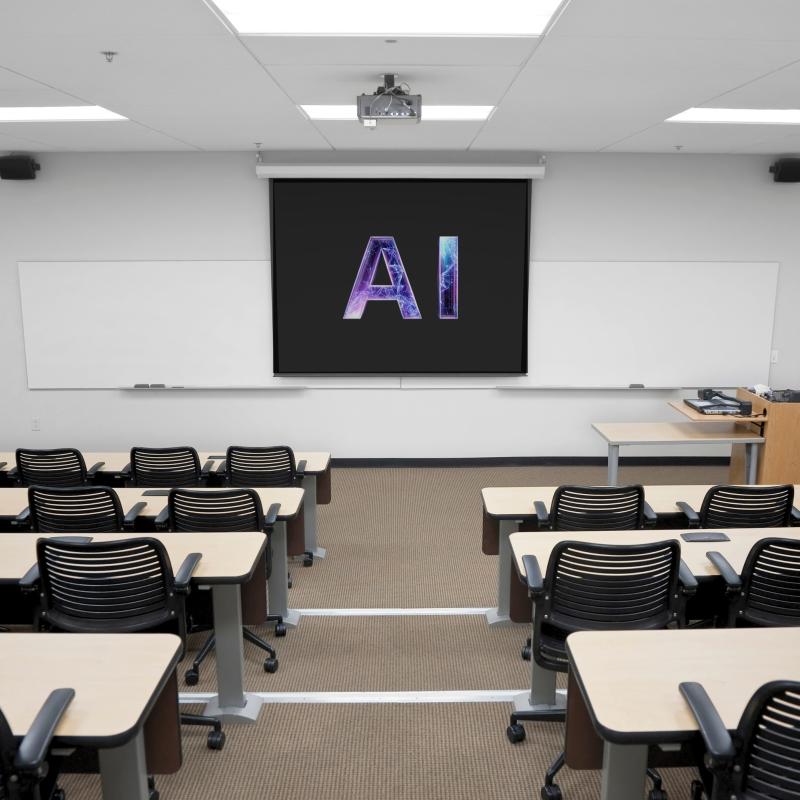Explore the UT.AI Hub
UT.AI Tools

Microsoft 365 Copilot
Visit our Microsoft for Copilot page, your go-to resource with workflow solutions, training, community conversations, and testimonials. By leveraging advanced AI capabilities, Copilot helps you create, analyze, and communicate more efficiently, making everyday tasks easier and more intuitive. Explore how to integrate Copilot into your workflow today and unlock new levels of productivity and collaboration.

UT Spark
Visit our UT Spark page, UT Austin’s free, secure AI platform for all students, faculty, and staff. It offers an easy-to-use conversational interface to help you integrate AI into your work and ideas, and empowers users to build personal agents tailored to their unique needs and interests.

UT Sage
Visit the Office of the Executive Vice President and Provost to explore Sage, a virtual instructional designer and AI Tutor developed by UT Austin experts. This tool is a safe, secure AI-powered tutor endorsed for use in UT classrooms. Built on responsible AI and sound pedagogical principles, Sage is designed to support student learning through conversational assistance. It gives instructors the ability to create interactive AI tutors that enhance student engagement and tailor learning experiences to individual needs.

UT.AI Roadmap
Explore The University of Texas at Austin's 2025–2026 AI roadmap featuring ChatGPT 5, Claude models, and UT Spark agents for campus services, designed to enhance digital experiences through strategic AI deployment.
Explore All Available AI Tools
Free AI Tools For All Longhorns

Microsoft 365 Copilot Chat
| Free for Students, Faculty, and Staff
- Approved under UT's compliance and security guidelines.
- A smart chat bot that can answer questions and generate content, but it does not have access to your work files or apps.

UT Spark
| Free for Students, Faculty, and Staff
- Approved under UT's compliance and security guidelines.
- Supports tasks such as brainstorming, summarizing, writing assistance, and building custom AI agents.

UT Sage
| Free for Students and Faculty
- Approved under UT's compliance and security guidelines.
- A purpose-built, in-house AI tutor platform developed by The University of Texas at Austin. It is designed to integrate directly with Canvas.

Gemini
| Free for Students, Faculty, and Staff
- Approved for usage with only published or non-sensitive data.
- Designed for tasks like text generation, summarization, and question answering.
Subscription Based AI Tools

Microsoft 365 Copilot
The premium version of Copilot, for $30/month per user, billed annually, that is fully integrated into your work tools and knows your context - so it can give you much more personalized and useful help.

ChatGPT-Enterprise
A secure, enterprise-grade version of ChatGPT with enhanced privacy, data isolation, and administrative controls. Request a license and/or API access from the OpenAI section on the AI Studio services page linked below.

Anthropic Claude
A secure, enterprise-grade AI tool with enhanced privacy and data isolation. Request a license and/or API access from the Anthropic Claude section on the AI Studio services page linked below.

AI Tools Matrix
The AI Tools Matrix provides a comprehensive outline of the AI tools available to the University. Take a closer look at which tool is right for you.
Getting Started with AI
Upcoming AI Training
These trainings are brought to you by Enterprise Technology. Our trainings are offered in Teams video conference, in-person or a hybrid setting. Join us today to get started in your journey.
Asynchronous AI Learning
These playlists of prerecorded videos provide you the flexibility to expand your learning on your time.
Introduction to Microsoft 365
This playlist covers the several videos introducing Microsoft 365, including its key components and how you can use Teams and cloud storage to collaborate across the ecosystem. It introduces Microsoft Copilot 365 Chat and other tools. Microsoft 365 Copilot paid license is not required for this recording.
Microsoft 365 Copilot Chat Web & Work
This prerecorded video focuses on Microsoft 365 Copilot chat functionality. It includes demonstrations with Copilot chat in web browsers and Teams, as well as with Copilot in tools like Word, Excel, and PowerPoint. Microsoft 365 Copilot paid license helpful but not required for this recording.
Microsoft Copilot Agents for your Department with SharePoint
This prerecorded video will guide you through accessing agents in SharePoint, creating your own agents using web-based data, and sharing and editing agents. You'll learn how to leverage these tools to enhance productivity and collaboration within your department. Microsoft 365 Copilot paid license required for this recording.
Microsoft 365 Copilot Across the Ecosystem
This prerecorded video delves into using Copilot for various tasks in Microsoft 365 apps such as gathering needs with Forms, enhancing communication, analyzing insights, and preparing presentations. It features hands-on activities to practice these skills and emphasizes prompt engineering. Microsoft 365 Copilot paid license helpful but not required for this recording.
Learning & Conversation Channels
Be part of the AI forward movement through hands-on trainings and active conversations in Microsoft 365 SharePoint and Teams. These collaborative spaces are designed to help you connect, share discoveries, and explore the evolving landscape of AI—together.

AI Studio
The AI Studio is a central space for advancing responsible, scalable, and impactful AI. As a cross-disciplinary initiative, it empowers students, faculty, staff, researchers, and partners to explore, build, and deploy AI solutions that create meaningful change across campus and beyond.

AI Conversations
AI technology is advancing rapidly, by connecting into this M365 Teams space, you can share your discoveries and explorations on AI.
FAQ
What is the primary goal of offering a suite of AI tools at UT?
The primary goal is to safeguard the University’s intellectual property and protect personal and sensitive data. While the suite includes AI tools familiar to students, faculty, and staff, it differs from public platforms by ensuring secure, University-managed access to institutional data. This approach allows the UT community to benefit from AI innovation without compromising privacy or security.
Why not use publicly available AI tools?
Public AI tools do not offer data or intellectual property protection. In contrast, UT Spark, M365 Copilot, and UT Sage provide a secure environment where users can explore, create, and innovate within protected boundaries.
How does UT address environmental concerns related to AI tools?
UT prioritizes data security while also working to reduce the environmental impact of AI. The University is committed to sustainable practices and will publish environmental impact reports on its website based on the sustainability efforts of its technology partners.
What steps is UT taking to ensure environmentally responsible AI development?
At the University of Texas at Austin, environmentally responsible AI is not an afterthought, it is the principle that shapes how we develop and deploy technology. Through our partnership with Microsoft, Copilot and UT Spark run on renewable-powered cloud infrastructure to reduce environmental impact. We continually refine our services as research points to more efficient approaches, and we work with leaders on campus and beyond to ensure our strategy advances responsibly as the technology evolves.
Data Protection & Environmental Sustainability
How is FERPA compliance handled in our AI tools and services?
FERPA is covered under the Data Protection Addendum established with the UT System for each of our approved AI tools. More information can be found on our website.
Microsoft’s approach to FERPA compliance is detailed here: FERPA
Where can I find the latest environmental sustainability report from Microsoft?
Microsoft’s most recent Environmental Sustainability Report includes comprehensive details on its global initiatives, including Azure’s platform-level sustainability efforts.
What are Microsoft’s sustainability commitments?
Microsoft has pledged to be carbon negative by 2030 and to remove all historical carbon emissions by 2050. Many Azure data centers already run on 100% renewable energy, with ongoing efforts to expand this globally.
UT Spark & Environmental Impact
What infrastructure does UT Spark use?
UT Spark runs on Microsoft Azure cloud infrastructure and utilizes the Azure OpenAI Service to deliver AI-powered capabilities.
Does UT Spark train AI models?
No. UT Spark is used for inference only, meaning it generates responses from pre-trained models. It does not perform model training, which is the most energy- and resource-intensive part of the AI lifecycle. This significantly reduces UT Spark’s environmental footprint.
How does Azure’s shared infrastructure contribute to sustainability?
Azure operates on a large, shared cloud infrastructure, allowing resources to be dynamically and efficiently allocated across many customers. This shared model reduces the need for individual hardware and improves overall energy efficiency.

Get Support
Visit the Enterprise Technology Support Center for quick solutions and helpful resources or use the online portal to request help. Need additional help, visit us in-person for a hands-on extension of the portal. View the Support Center hours of operation.
Guidance & Resources

Available AI Tools
Visit this knowledge article to gain additional insight to the tools available to students, faculty, and staff.

Eight Core Enabling Mechanisms for AI
UT's AI strategy encompasses fostering innovation, establishing governance frameworks, ensuring strong leadership, operationalizing AI solutions, building robust data infrastructure, offering support and advisory services, and empowering the community to engage with AI responsibly.

Guidance for Using AI
UT is committed to fostering innovation while upholding the highest standards of security, privacy, and academic integrity. Responsible use of AI tools includes adhering to relevant policies that protect confidential, personal, and proprietary data, as well as following ethical guidelines that prioritize transparency, accountability, and fairness.

Generative AI in Teaching and Learning
Center for Teaching and learning (CTL) provides a library of resources on the use of AI and guidance to develop new curricula, create tailored assignments, and design inventive project-based programs. AI as an intelligent tutor, providing flexible learning options and interactive discovery that cater to diverse learning needs.